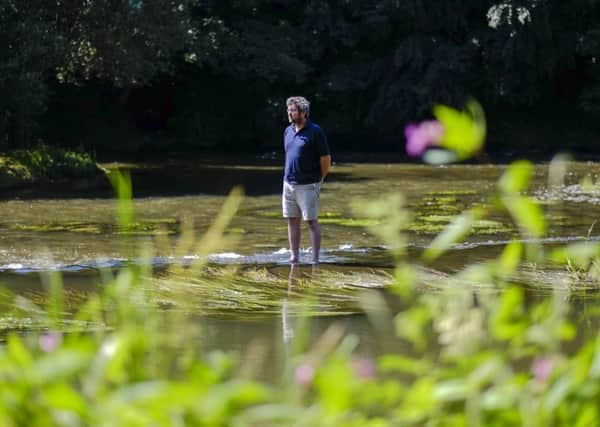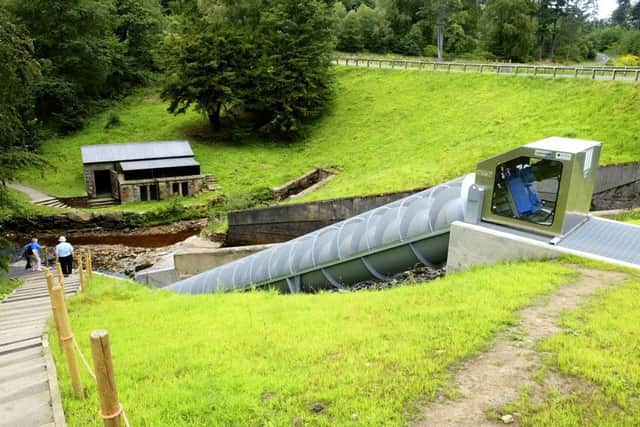Greener than fracking: The giant screw in North Yorkshire's countryside


In our own small corner of the world, the controversial process of fracking – releasing shale gas from rock by injecting a high pressure jet of water, sand and chemicals into it – is very much at the forefront of many people’s minds. North Yorkshire County Council recently granted the first licence in the UK for fracking to be carried out in the region, near Kirby Misperton.
Among the controversies surrounding the process is the environmental cost of transporting and using the huge amounts of water necessary. But just up the road from Kirby Misperton, one small company in Malton is quietly proving that there are alternative, greener methods of creating substantial amounts of energy from water.
Advertisement
Hide AdAdvertisement
Hide AdMannPower Consulting Ltd is pioneering the use in this country of the Archimedes screw. It’s a simple, modern application of an ancient technology, attributed, as the name suggests, to the Greek physicist, mathematician and all-round scientific innovator Archimedes. Early screws were simply spiral constructions inside a tube, spun by hand or wind power to lift low-lying water to higher ground.


Some historians believe they were used to irrigate the Hanging Gardens of Babylon, and one ingenious modern American company uses the technique as an elevator for fish, punningly calling it the Pescalator.
Reverse the process, though, by allowing naturally running water to flow through the screw of its own accord, and you create energy, efficiently and, perhaps more importantly, cleanly.
MannPower managing director Dave Mann’s journey began when he joined a huge global corporation after leaving York University with a degree in engineering in 1989.
Advertisement
Hide AdAdvertisement
Hide AdFor 14 years, Dave travelled the world, latterly with his wife Mo and young family in tow, as an oilfield services seismic engineer, part of a team seeking out new sources of fossil fuel, and seeing at close quarters the damage that the exploration and extraction of those fuels can do to the environment.


In late 2003, the family returned to the UK and began to consider their future. With Dave having met Mo at York University, and the area being neatly between their two families in Northumberland and Suffolk, the couple liked the idea of living in Ryedale.
Whilst house-hunting one day Dave spotted an intriguing symbol on an OS map denoting a watermill, on an island on the River Derwent near Howsham. It turned out to be the derelict 18th century Howsham Mill, although he only discovered that after edging his way onto the island across a perilously wobbling girder, so overgrown was it. The couple fell in love with the beautiful, John Carr-designed mill and took it on as a project, setting up the charitable Renewable Heritage Trust.
Thirteen years, £1.2m worth of fundraising and an appearance as Northern finalist in the 2006 series of the popular BBC programme Restoration later, Howsham Mill is a beautifully restored education centre, offering craft and science courses, playing host to outdoor Shakespeare and even running its own cinema club – all powered by the UK’s first ever Archimedes screw.
Advertisement
Hide AdAdvertisement
Hide Ad“When we first took on Howsham, given the quantity of water that flows through it, we thought it made sense to put a conventional turbine in the sluice,” says Dave. “But it’s a Site of Special Scientific Interest (SSSI), and a European Special Area of Conservation because of the rare lamprey that live in the river around there, so the Environment Agency said no.
“I’d heard about a company in Germany that had adapted the Archimedes screw to work as a turbine, so went over to take a look. It was obviously perfect for us, so I asked them who their representative in the UK was – and they told me there was no one; we didn’t know the technology over here at that point.”
It seemed too serendipitous to be true – not only had Dave found the turbine he wanted for his personal project at Howsham, but also the beginnings of a brave new green business.
Since MannPower started up in 2004, Dave and his eight-strong team have installed Archimedes screws at sites across the UK and Ireland, including at a secondary school at Totnes in Devon, and at Romney in Berkshire, where their scheme on the River Thames provides renewable energy to Windsor Castle.
Advertisement
Hide AdAdvertisement
Hide AdPerhaps most remarkably, they last year opened a scheme at Cragside House in Northumberland, taking hydroelectricity back home – the house was the first ever to use it back in 1878.
Current projects include the installation of a scheme on the stunning Ardtornish Estate on Scotland’s west coast; and closer to home, at Linton Lock, between York and Harrogate, an extension of an existing MannPower scheme.
Such is the public interest in green energy that the £2.5m cost of the Linton scheme was raised in under five weeks through a bond offer handled by ethical bank Triodos. It will include a £400,000 custom-designed slalom canoe course, funded partly by the bond offer, partly through a grant from Sport England via Canoe England, the sport’s governing body in the UK.
The technology has also gained the approval of the Environment Agency for its fish-friendliness. Pat O’Brien, the agency’s fisheries technical specialist for North and East Yorkshire, says: “The Linton scheme will improve the situation for all upstream migrating fish by repairing the old fish pass and adding a totally new one that is good for fish passage and canoeing.”
Advertisement
Hide AdAdvertisement
Hide AdAnd Dave is keen to see his expertise help those who he encountered in his years in oil exploration in developing countries. Burma holds a special place in his heart – he lived there for two years and still has many happy memories of the place.
In mid-August, he will return to the country for the first time in a work capacity in 25 years to give a paper on “Ultra-Low Head Micro Hydro Systems for Rural Electrification’ at the Myanmar Green Energy Summit. “From Myanmar to Malton and back again – it’s a nice circle,” he says. “I’d love to think that a company in Ryedale could soon be helping to provide cheap, green power for rural villages in Burma!”
MannPower facts and figures
Over the last 12 years, MannPower Consulting has installed 70 hydropower schemes across the UK, with a total output of 5MW.
That amount of electricity would power all the households of a town five times the size of Malton, or half the households in Ryedale.
The carbon savings created by the various schemes are estimated at 8,000 tonnes per year.